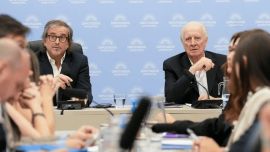Former US defence secretary Donald Rumsfeld, who led the nation into war in Afghanistan and Iraq during the presidency of George W Bush, has died at the age of 88 in New Mexico, his family announced Wednesday.
In charge of the US military for most of George W. Bush's presidency, Rumsfeld was stubborn and brash, famously dismissing widespread looting after US troops captured Baghdad by quipping, "Stuff happens."
For millions who took to the streets to denounce the war in Iraq, Rumsfeld and vice-president Dick Cheney were emblematic of what was seen as excesses in Bush's "war on terror," including the indefinite detention of suspects in Guantanamo Bay, Cuba, and the abuse of Iraqis by US jailers at Abu Ghraib prison.
The former congressman's brand of hawkish politics eventually fell from favour as politicians from both sides turned on "forever wars," and the troops he first sent to Afghanistan after the September 11, 2001 attacks will make their final withdrawal weeks after his death.
His family said that Rumsfeld – who after resigning in 2006 not only spent years defending his legacy but also dabbling in software and even releasing a solitaire app – died in Taos, New Mexico, and described "the integrity he brought to a life dedicated to the country."
"History may remember him for his extraordinary accomplishments over six decades of public service, but for those who knew him best... we will remember his unwavering love for his wife Joyce, his family and friends, and the integrity he brought to a life dedicated to the country," they said in a statement.
George W. Bush also mourned the loss, describing the ex-US official as a "very good man."
"A man of intelligence, integrity, and almost inexhaustible energy, he never paled before tough decisions, and never flinched from responsibility," Bush said in a statement that did not explicitly mention the controversial decision to attack Iraq. "He was a faithful steward of our armed forces, and the United States of America is safer and better off for his service."
'We take the war to the enemy'
Along with Cheney, Rumsfeld was one of the main architects of Bush’s Middle East wars, triggered by the terrorist attacks of September 11, 2001, when one of four hijacked airliners crashed into the Pentagon while he was still in the building. Rumsfeld’s job then evolved to include fighting two of the longest wars in US history, during which he was called upon to finesse the administration’s military shortcomings at press conferences.
“Defending against terrorism and other emerging 21st-century threats requires that we take the war to the enemy,” Rumsfeld said in speeches in 2002.
Rumsfeld had clamoured to remove Iraqi dictator Saddam Hussein, pushing soon after the fall of Afghanistan's Taliban to move into Iraq, where he suggested there were weapons of mass destruction and perhaps links to terrorist groups.
Asked in 2002 about the lack of evidence, Rumsfeld gave perhaps his most memorable statement.
"Reports that say that something hasn't happened are always interesting to me, because as we know, there are known knowns; there are things we know we know," he said. "We also know there are known unknowns – that is to say we know there are some things we do not know. But there are also unknown unknowns – the ones we don't know we don't know."
Many Americans embraced Rumsfeld's tough-guy persona during the Afghan war, but it faded in the lead-up to Iraq.
Just weeks before the invasion, Rumsfeld dismissed a warning by the army chief of staff that several hundred thousand troops were required to occupy Iraq, calling the estimate "far from the mark."
In remarks that would prove prophetic, Rumsfeld told reporters it was "not knowable" how many troops would be needed, saying they did not "have any idea whether or not there would be ethnic strife."
The United States invaded Iraq on March 20, 2003 with a force of fewer than 100,000 troops. Baghdad fell quickly, and Saddam's regime collapsed amid an orgy of looting. But the failure to commit enough troops to secure the country became viewed as a central mistake, leading to intense civil war in which hundreds of thousands of civilians died.
With Saddam's Baath Party disbanded, Sunni Muslims launched an insurgency that would later be the root of the brutal Islamic State group as the majority Shiites took the reins of power with backing from Iran.
Rumsfeld long defended the war. But in his memoir, he regretted that Bush did not accept his resignation after pictures emerged of prison abuse in Abu Ghraib, saying he had become a "dangerous distraction."
"More than anything else I have failed to do, and even amid my pride in the many important things we did accomplish, I regret that I did not leave at that point."
Political career
A former politician and bureaucrat, Rumsfeld was already a seasoned executive when he began his second term in the job as Bush came to power in 2001. During the 1970s, he became the youngest-ever defence secretary, at age 43, in president Gerald Ford’s administration. At the end of his tenure under Bush, he was the oldest US citizen ever to hold the job.
Rumsfeld was assigned the task of reforming the military for the new challenges of the 21st century and ended up taking much of the flak for protracted campaigns abroad as the Pentagon budget swelled. His insistence on using light invasion forces in both Afghanistan and Iraq, and his lack of planning for the post-invasion periods were among the most salient criticisms of his tenure.
“Stuff happens,” Rumsfeld said in response to a reporter’s question about looting in Baghdad after the United States had ousted Saddam Hussein in 2003. “There is untidiness.”
Rumsfeld became a figure of controversy as the wars ground on against a backdrop of rising insurgency. There were scandals over alleged torture of prisoners at Abu Ghraib in Iraq and Guantanamo Bay, Cuba, while the US failed to find Iraqi weapons of mass destruction, the pretext for the invasion. His brusque attitude and gnomic utterances such as “known unknowns” and “unknown unknowns” made him a lightning rod for the wars’ sceptics.
“You go to war with the Army you have, not the Army you might want or wish to have at a later time,” Rumsfeld said in 2004 in response to a soldier’s question about inadequate Humvee armour, according to a New York Times article in 2004. The comment drew condemnation, partly because it was the administration that had chosen the invasion date – March 20, 2003.
By 2006, Rumsfeld’s popularity within the US armed forces had declined to the point where six retired generals, including some who had served in Iraq, called on him to resign. Bush accepted Rumsfeld’s resignation on November 7, a day after Democrats captured both houses of Congress in midterm elections.
'Known and unknown'
Donald Henry Rumsfeld was born on July 9, 1932, in Chicago, according to his 2011 memoir, Known and Unknown. He was the son of George Rumsfeld, a real-estate agent in Winnetka, Illinois, and the former Jeannette Husted, a homemaker.
A state champion wrestler and Eagle Scout, Rumsfeld attended Princeton University on scholarship and a Navy ROTC stipend. After receiving his arts degree in political science in 1954, he married his high-school girlfriend, Marion Joyce Pierson. He served three years in the US Navy, during which he became a flight instructor.
In 1957, Rumsfeld became a legislative assistant to Ohio congressman David S. Dennison. When a Chicago seat in the House of Representatives became vacant in 1962, Rumsfeld ran as a Republican and won. At age 30, he was youngest House member.
Rumsfeld gave up his seat in 1969, when president Richard Nixon persuaded him to head the Office of Economic Opportunity, according to his memoir. There, Rumsfeld’s hires included two future defence secretaries, Frank Carlucci and Cheney. Thirty years later as vice-president, Cheney helped bring Rumsfeld out of retirement to lead the Pentagon.
Rumsfeld later served Nixon as a White House counsellor and as ambassador to the North Atlantic Treaty Organisation. The NATO post kept him out of Washington for the Watergate debacle that brought down Nixon in 1974.
He returned to Washington in 1974 as President Ford’s new chief-of-staff, and the following year, Ford appointed him defence secretary. Rumsfeld put into production the B-1 bomber, Trident submarine and the MX Missile – weapons that helped define the US military’s posture for decades to come.
With the election of Jimmy Carter as president in 1976, Rumsfeld left politics for business. He became chief executive officer of Skokie, Illinois-based G.D. Searle & Co, a troubled pharmaceutical company. Rumsfeld masterminded a corporate turnaround and engineered its 1985 merger with Monsanto Co. He also held top jobs at General Instrument Corp and Gilead Sciences Inc, a bioengineering and pharmaceutical company.
Rumsfeld kept his hand in Republican politics. In 1980, he was an also-ran for Ronald Reagan’s vice-presidential mate. In 1988, he made a short-lived presidential bid. He also served briefly as Reagan’s special envoy to the Middle East and journeyed to Baghdad in 1983 to meet with Saddam Hussein.
In retirement, Rumsfeld was unapologetic for his role as planner of wars that stretched far longer than intended.
In addition to his memoir, he published in 2012 a book of aphorisms, Rumsfeld’s Rules, that he had collected over decades and once distributed to staff in Ford’s White House. Among these was “Proper preparation prevents poor performance,” and “Plan for uncertainty.”
Rumsfeld and his wife had three children, Valerie, Marcy, and Nicholas.

























Comments